





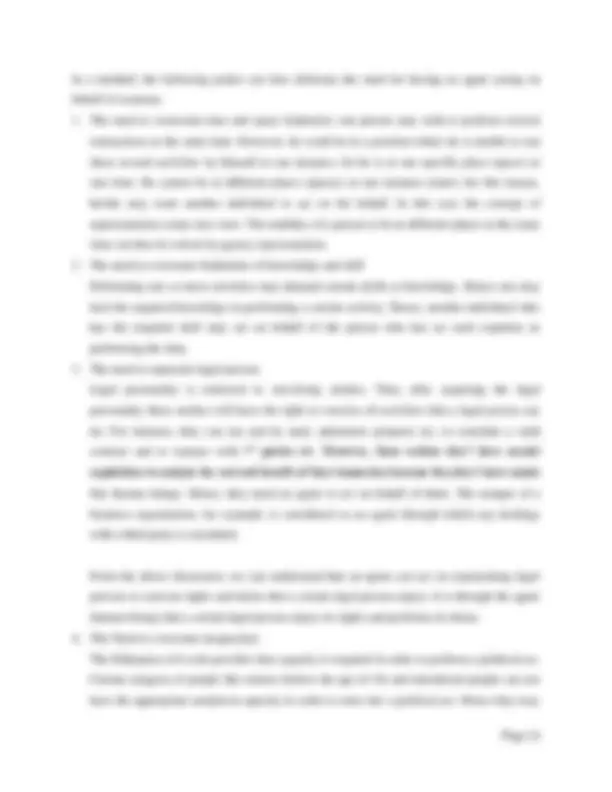














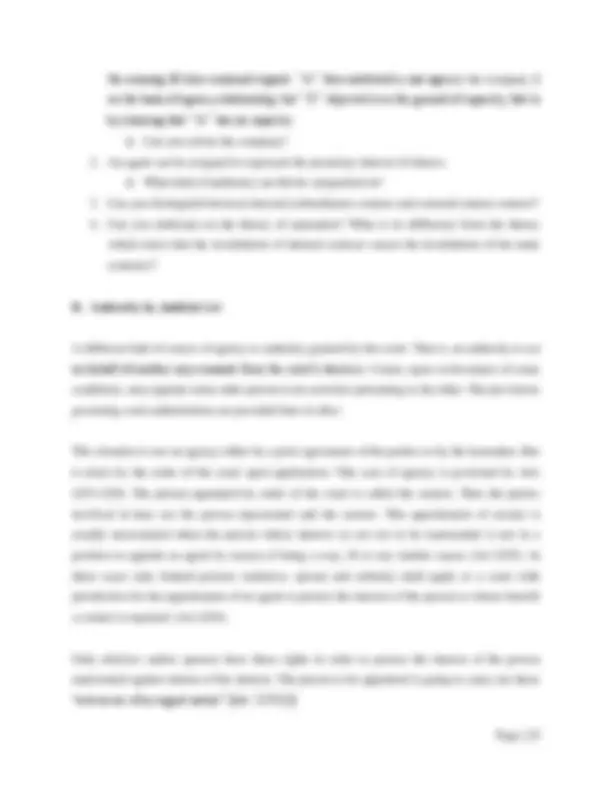


















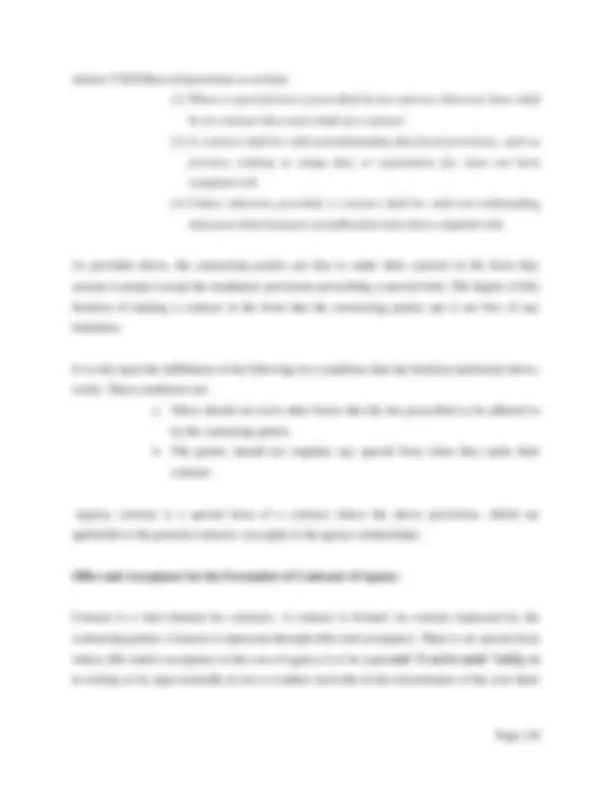










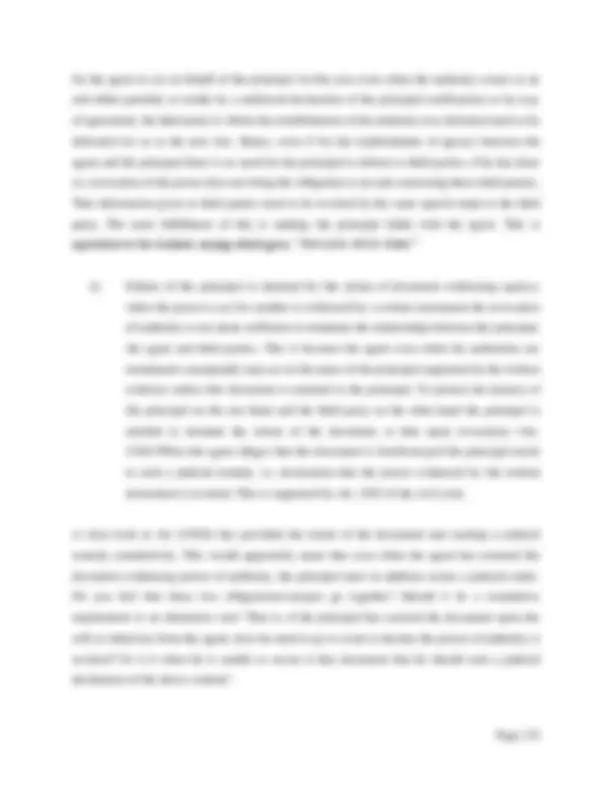

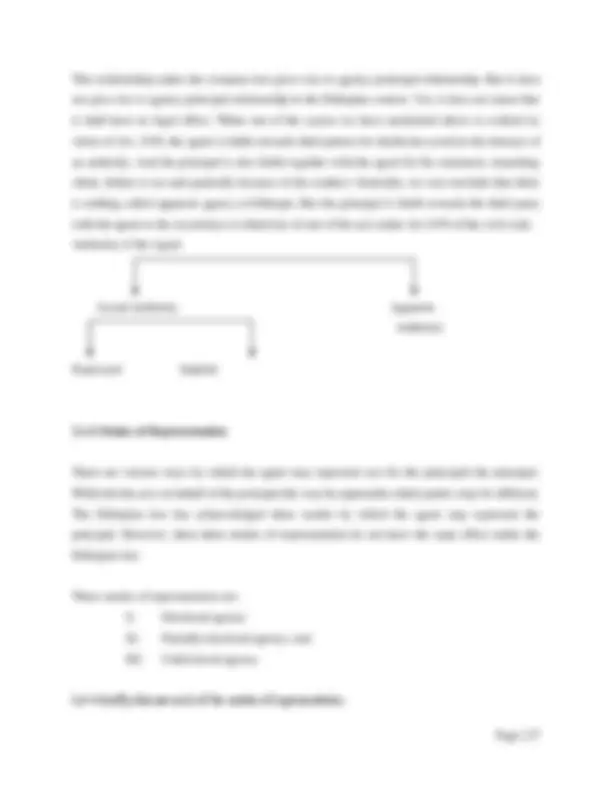




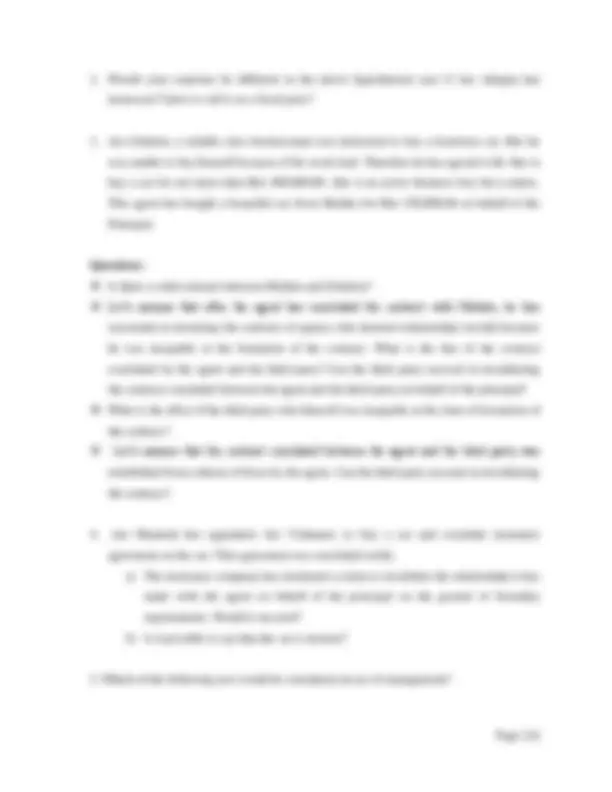
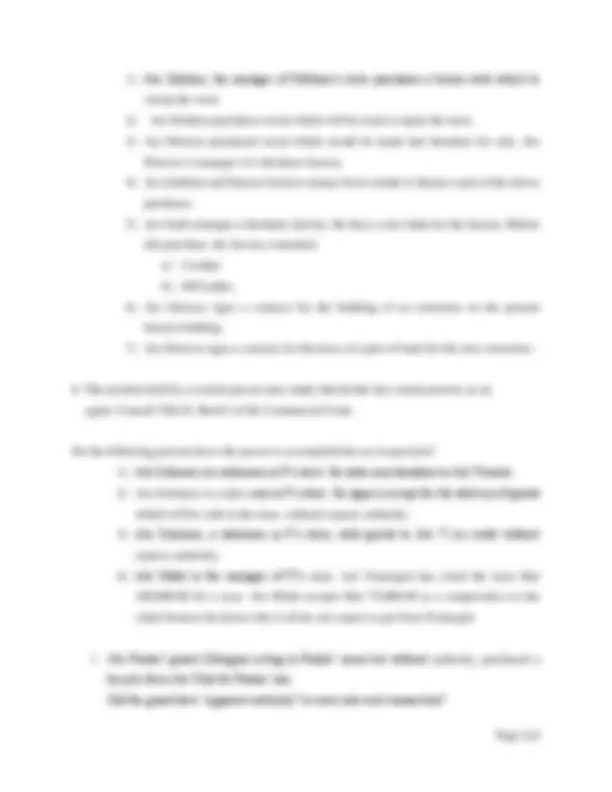
































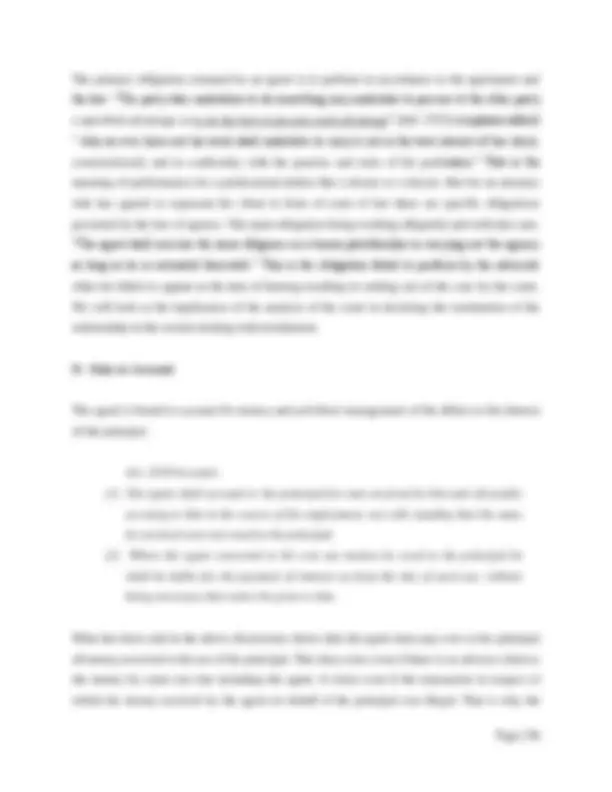


Study with the several resources on Docsity

Earn points by helping other students or get them with a premium plan


Prepare for your exams
Study with the several resources on Docsity

Earn points to download
Earn points by helping other students or get them with a premium plan
Community
Ask the community for help and clear up your study doubts
Discover the best universities in your country according to Docsity users
Free resources
Download our free guides on studying techniques, anxiety management strategies, and thesis advice from Docsity tutors
Agency Law , Concept of Agency, Preliminary Considerations, Internal Contract, External Contract, Sources of Authority, Contractual Agency, Civil Law Approach, Ethiopian Approach, Internal Contract. This is not a lecture notes. Its teaching material for a complete course. It was prepared by faculty of law.
Typology: Study notes
1 / 172

This page cannot be seen from the preview
Don't miss anything!





























































































**1) Awet Hailezgi (Mekelle University, Faculty of Law)
2009
Table of contents
Chapter One
1.1 Genesis and Aevelopment of the Law of Agency 1.1.1 Theories and development of the law of agency under the common law legal system
1.1.2 Theories and development of the law of agency under the civil law legal system. 1.2 Sources of Authority
A. Authority derived from a contract i. Internal contract ii. External contract B. Authority by judicial act C. Authority derived from the law
2.3 The Ethiopian approach
Chapter two Agency by Virtue of Contract under Ethiopian Law.
Introduction 2.1 The internal contract
2.1.1 Formation requirements 2.1.2 Offer and acceptance for the formation of contract of agency
Del Creder commission agent Forwarding agent
Chapter Five Extinction of Agency Relationship Agreement of parties Unilateral declaration by the parties Revocation Renunciation (Repudiation) Termination by the operation of the law Liability to one another and to a third party
Course Introduction
One may not be able to perform a given task by oneself for several reasons. Or one may not be at different places at the same moment to perform a certain deed, Hence if a task has to be carried out in his absence or without his involvement, there has to be some other individual who can undertake the task on his behalf.
This course is meant to Asses the agency law in two broad categories. That is, agency in non- commercial activities and agency in trade (commerce) Accordingly, the first chapter provides the preliminary concepts on the law of agency, introductory remarks, genesis and development of the law of agency, and sources of authority.
The second chapter deals with the Ethiopian context, with great emphasis on the contractual agency. This chapter is also categorized into two major topics that is the internal contract and external contract. Under the former topic, the formation requirements for internal contract, scope of authority and modes of representation are discussed, and then discussions on the external contract follows.
Agency relationship has its own effect on parties, beyond establishing relationships between the principal, agent and the third party. Hence the liabilities of the agent, principal and third party, and the liabilities that exist upon the ratification of an unauthorized act are discussed under this chapter.
The second part of this course deals with the agency in trade or commerce, hence the concepts of commission, del creder agent and forwarding agent are discussed exhaustively.
Lastly, this course deals with the extinction of agency relationship. It also encapsulates summary questions and short hypothetical examples in order to make the concepts clearer and visible for students. Discussions on real and hypothetical cases are made in order to make the course more practical and achieve its objectives.
for the study of the law of Agency and Business organizations, Faculty of Law, Haileslase I University, p.1)
In addition to the above, one writer, Mulgeta Mengist (2005 ) states the following; The concept of Agency is recognized in all modern legal systems as an indispensable part of the existing social order. It fulfills the most diverse functions in the public and private law of today; in particular it assists in organizing the division of labor in the national and international economy, by making it possible for a principal to extend his individual sphere of activity. By its aid spanning space and time, he is able to have one or more persons act for him, on his behalf, if necessary (the advantages of Agency) for the institution of modern life based on the division of labor, predominate to an extent that agency is every where prevalent .An agent is appointed when an individual is unable to act himself on account of his manifold occupations, absence, illness, advanced age, etc. Or a representative may be designated in order to take advantage of his special capacity, knowledge, and experience even for the mere desire, such as not to appear personally in order to avoid hostility, controversy, etc or similar considerations.
With regard to the concept and significance of the law of agency, two other writers stated as follows:
The purpose of the law of agency and the need to employ agents, to perform certain tasks which their principals have neither time; nor knowledge nor experience to perform by themselves scarcely requires explanation in the highly commercial and industrialized world. Commerce would literally come to a standstill if businessmen and merchants could not employ the services of factors, brokers, forwarding agents estate agents auctioneers and the like and were expected to do everything by themselves. These specialized middle men, whose main purpose usually is to make contracts on behalf of their principals or to dispose of their principal‟s property, are to be found in all advanced societies and, whether one accepts or deplores some of the economic consequences of this phenomenon, the fact is that the agent‟s activities are an inevitable feature of a developed economy. Hence the growth of the law of agency, both in volume and sophistication, has matched the growth in importance of commerce, as we know it today. (Markesinis and Munday, pp.3-4)
Defining the concepts in the law of agency in the above way may not be enough and appropriately reflect the whole concept of the law. Two writers provide the inconveniences with defining disciplines or concepts in very few words in the following manner:
They argue that definitions may be of use and, at times are quite necessary when contracts or statutory enactments have to be construed, for in such cases they can help define the terms used in the documents. But they are of doubtful validity in books or lecture courses, they can also be misleading, especially if they attempt to compress the entire subject under consideration into a single sentence, which is intended to be both concise and meaningful. This is also true with the law of agency where academics have been quick to criticize each other‟s definitions and find in them errors and omissions. There is, therefore, no justification for yet other definitions, which, more likely than not, will prove unsatisfactory.
In ancient Roman law, for a contract to exist between two persons, both of them should be personally and physically present. Conclusions of contracts were like a ceremony, which was made by adhering to certain formalities and including some words to say repeating. So many reasons have been given to justify the absence of the concept of representation (Agency) in the Roman law. One of the explanations attributes to the roman conception of the personal nature of obligation. The personal nature of obligation under this legal system is closely related with the strict formalities of the Roman law. With regard to the formation of legal relationships, the Romans attached special significance to formal ceremonies in which certain acts were performed and solemn words repeated. Owing to this reason, the law refused to grant rights and duties on a person who did not actually participate in such ceremonies and fulfill the required formalities. Hence the Maxim, aleri stipulario nemo potest , excluded stipulations in the name of third party and stipulations for the benefit of a third party. The other view that holds for the absence of agency in the Roman law was owing to the patriarchal economy of the Romans. This economy was least developed, and almost all business transactions were limited within the family. Hence it is possible to infer that there was no need for the institution of agency.
In a nutshell, the following points can best elaborate the need for having an agent acting on behalf of someone.
From the above discussion, we can understand that an agent can act on representing legal persons to exercise rights and duties that a certain legal person enjoys. It is through the agent (human being) that a certain legal person enjoys its rights and performs its duties.
fail to analyze the cost and benefit of the transaction. Hence some one else who can act on behalf of them is appointed.
Questions for discussion
1. Can you explain the importance of agency relationship? 2. How can you define the concept of law of agency?
1.1Genesis and Development of the Law of Agency
The concept of agency representation in the sense it is understood now emerged around the twelfth century (A.D) along with the salve and slave owner‟s relations. Since the early time, salves were considered as a mere chattel without any rights. It was logical to hold the owner legally liable for the acts of his slave, especially if the acts of the slave were done based on the direction of the slave owner. Hence this slave and slave owner relationship paved a way for the creation and the concept of representation. And during this time, the responsibility of a principal for the acts of his agent or servant was commenced.
The concept of agency developed independently in the civil and common law legal systems. However, the rudimentary rules of agency representation as it is understood today became visible in both legal systems around the end of the twelve-century and early thirteen centuries.
Although, the concept of agency representation appeared around the end of the 12th^ century, its rules came to be arranged and significant, in order to facilitate commercial centers in the 19th century. Where business activities widely spread in most parts of the world especially in Europe commercial transaction was highly developed in volumes. Owing to this reason the rules of agency started to be organized and collected from the various fields over which they were distributed. (Law of agency, Am. J: comp. law vol.6 (1957) pp.165)
According to this, when it is compared with the English law of contracts, the Roman law of contracts never developed the theory of agency to such an extent as the English law of contracts had achieved.
In order to have a broader concept on the genesis and development of the law of agency, let‟s discuss the genesis and development of the law of agency in the following legal systems.
1.1.1 Theories and Development of the Law of Agency under the Common Law Legal System
The up-to-date concept of agency in the common law legal system is the outcome of many influences in its history. It is believed that agency was not part of the common law until the 13th century. However, owing to the master and servant relationships which emerged around the end of the12th^ century and beginning of 13th^ century.
While we discuss the historical development of the theory of agency in the common law legal system, we can observe that, three main standards gave raise to the effective development. These factors are:
Owing to the influence of mercantile law by which commercial activities were developed in volume, the common law developed the principle that a principal was in direct contractual
relation with third parties in which such principle laid down the foundation for the theory of agency. The development of such principle makes the principal liable to third persons. This liability was with regards to the goods bought or acquired by the agent, on the basis of which the principal had thereby obtained the use and benefit of the goods.
The genesis of such principle, which makes the principal in direct contractual relationship with third parties in a contract made by his agent, emerged from the case of Costace V. Forteye, which was decided in 1389 by the major and elder men of the city of London. Under this particular case, an apprentice and attorney of a London merchant bought wine from a French merchant for his master (Fortenye); and when he failed to satisfy the full payment to the seller, the agent was committed to prison. However, the agent (apprentice) i.e. Costance, alleged that it was his master who sent him to buy the wine and then the master approved the bargain. The Mayor then ordered the master (defendant) to satisfy the full payment to the French seller and set the plaintiff free from prison. The decision of the Mayor was based on the ground that the apprentice bought for the use and benefit of the master. (Willam Holdsworth/sir/, A History of English Law vpl 8, 1966, pp223)
The point that we can understand from the above case is that, a direct claim by a third party was admitted against the principal for contracts made by his agent for the benefit of the principal.
The trend of being represented through an agent spread somehow readily in the course of the 12th and 13th^ centuries owing to the allied influence of mercantile necessity and cannon law. In addition to this the development of trading companies, which must necessarily act through agents, helped its further development.
In the medieval period, the idea that it is possible to make a contract through an agent, and that it is possible for a man to ratify for a contract made on his behalf through an agent was recognized by the common law. The common law also, accordingly, recognized that on such contracts by an agent on behalf of his principal, it was to be held that the principal and not the agent was liable „‟ not only when the agent had express authority to do the particular acts, but also when he acted
contracting partiers was the governing rule of the old Roman contract law which did not admit the triangular relations of principal, agent and third party in business transactions.
In addition to the above factor, the reason that hindered the development of the evolution and the inadequacy of the outcome may have been due to the fact that, “business agents were often slaves and that within the family the law yielded family satisfaction results at quite an early stage of its history.‟‟(Barry Nichlsa, An introduction To the Roman Law, 1965, pp.201)^ Owing to this condition, any benefit or property accrued to the patter families (father or head of family)
The concept of agency started to develop in the Roman law, however, in the 15th^ and 16th centuries and slowly had to recognize the activities of the procurator in connection to theses two classes of persons.
What is a procurator? A procurator was a free man, often a freed slave who acted as agent for the interest of a noble family, while an instate was normally a slave who sold his master‟s goods „‟ (F.H.Lawson, The Roman Law Reader,(1969)p.103)
The pressure of mercantile needs in the middle ages, the influence of the cannon law contributed a considerable importance in the contractual agency development. And the remarkable feature resulting from the principal and agent liability in the early Roman law was that,‟‟ The freeman who acted as an agent, usually known as a procurator, became invariably liable to the third party and the agent with no connection between the principal and the third party.
In the earliest times, as stated above, owing to the personal nature of the roman law, a master or parent acquired the benefit of contracts entered into by slaves or sons, whether they contract in their own name or in his own name. But, even though he received the benefits derived from such contract, he was not held liable to the contacting third party. Nevertheless, at a certain point, in the historical development of the Roman‟s the agency concept, holding masters liable for acts of their slaves or agents was observed.
Questions for Discussion
1.2 Sources of authority
Introduction
Obviously, an agent is a person who has the authority to act in the name and on behalf of another person called the principal. In other words, it is an authority given to the agent to perform juridical acts as a medium of an intermediary with another person called the third party. By juridical act, we mean acts having effects before the law. These acts performed within the scope of the authority granted, will bind the principal directly. That means the rights and obligations of the contract are that of the principal and the third party. The agent there is only to facilitate the formation of the contract and hence cannot be held liable for the non-performance by both the principal and the third party.
Here the main question to be raised is: what is mean by the authority of the agent.
There is no single whole definition of authority in the existing written materials. Different writers have given different definitions of authority based on the intended purpose of focus. In ordinary words authority is the right to exercise powers.
As we can see from the above provision, an agency is a contract, which is formed between the agent and the principal.
Obviously, under such agency relationship, which arises out of a contract, we find two independent contracts. These are regarded as Internal contract [subordinate contract] External contract [main contract]
I. Internal contract [subordinate contract]
Internal contract is a contract that exists between the principal and an agent. Under this contract the principal concludes a contract with an agent under the auspices that the agent could play an important role in the formation of the main contract. That is the agent could enable the principal to transact with a third party through an intermediary or an agent. This contract is essentially concerned with the rights and duties of such parties. In most cases, this internal relationship is created by contract, although there are cases where it could be created by the operation of the law, to determine the respective duties and rights of the parties. In any manner, one has to basically rely on the terms of the agreements of the parties in order to distinguish their respective duties and rights.
II External contract [main contract]
External contract is a contract that exists between the principal and a third party. This relationship is the most crucial aspect as far as the law of agency is concerned. It is concerned with the rights, duties and liabilities that could be created as between a principal and a third party through the intermediary of an agent. In this regard, for a direct relationship to be created between the principal and the third party, in principle, the agent must have acted in the name and on behalf of the principal within the scope of his power. Once these elements are fulfilled, as regards the effect of the contract, the agent steps out and only the principal and the third party remains to be parties to the contract concluded. Consequently, the rules of an ordinary contract,
which could operate between two contracting parties, will be applicable to the principal and third party relationship.
Furthermore, it must be noted that agency is one of the special types of contract and thus, the rules applicable to the formation of a valid contract, are of necessity, applicable to the agency relationship. Accordingly, the elements required under the law for the formation of a valid contract as enumerated under art. 1678 of the civil code are required in agency contract as well. These elements are A. The parties must be capable of contracting and give their consent sustainable at law. B. The object of the contract must be sufficiently defined, possible, and lawful. C. The contract must be made in the form prescribed by the law, if any.
Therefore, the formation of a valid agency relationship requires the existence of certain essential elements. If these elements are not satisfied, the agency relationship becomes invalid. Accordingly, parties to the agency relationship must have the capacity to enter into the contract, their consent must be sustainable at law, the object of the contract of agency relationship must be sufficiently defined, possible and lawful, and finally the contract of agency must be made in a prescribed form if any.
For the sake of clarification, we need to see the basic elements of contract agency under the following subtopics.
Capacity
The first essential requirement for the validity of a contract is the capacity of the parties. The literal meaning of capacity is the ability to do something. Since agency relationship is a special type of contract the party who wishes to enter into an agency relationship must have the capacity to do so. Thus, capacity to a contract means competence to enter into a legally binding agreement.